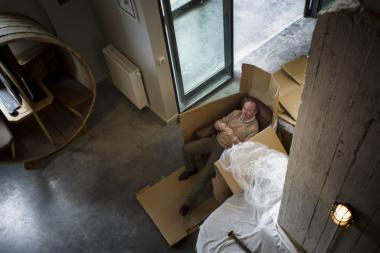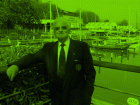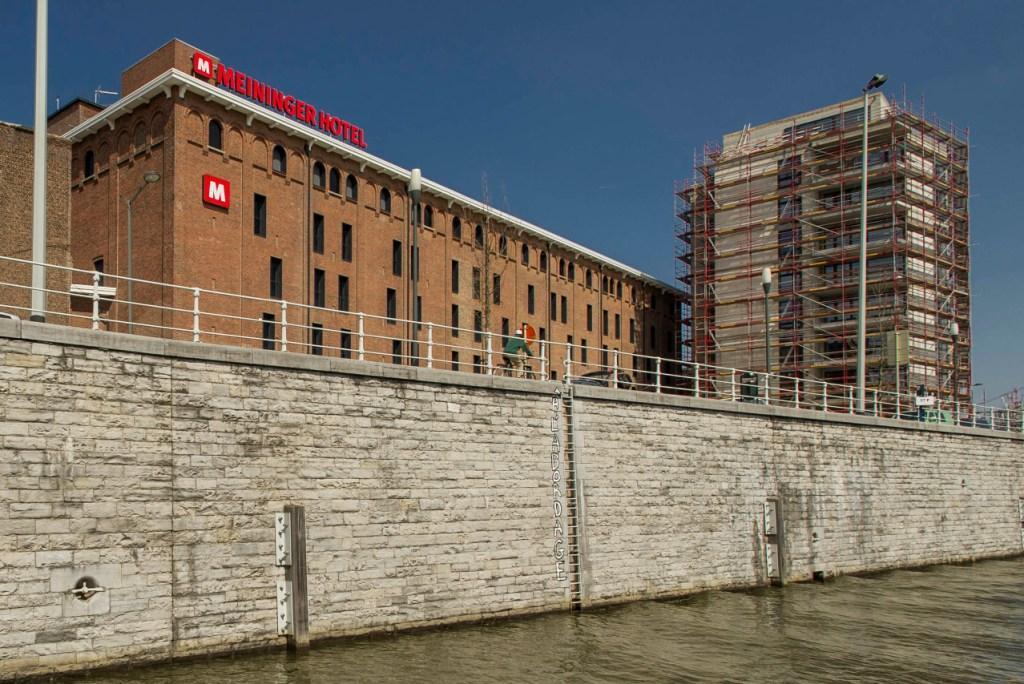
The 49-year-old creator, developer and promoter is preparing to create Brussels’ first hotel with a view over the Canal. We meet an enthusiast at the point where his dream has become reality.
2013-04-05 – From studying law to entering the banking world is but a short step. But how do you go from studying law to producing films, before diving headlong into virtual real estate tours? “It comes from a taste for independence,” is how Jean-Paul Pütz explains it. Later on, he thus found himself purchasing small properties and renovating them before putting them back on the market. Architecture and urban planning were already interests of his: he firmly believes that chaos is the root of all ugliness, and that beauty means security!
Enthusiasm and building quality
But when the crisis first reared its hideous head in 2008, naturally, he was caught in the crossfire. He would not have been a fun person to meet at that time, when his nights were haunted by the spectre of bankruptcy. Today, though, in front of the work site, now nearing completion, at the former Belle-Vue brewery in Molenbeek, it is quickly clear that this dynamic guy has found the perfect project in which to develop his taste for calculated risk and his formidable enthusiasm.
On this icy afternoon in a winter that has eked itself out ad infinitum, clad in chunky sweater and clodhoppers, and with his hair now cut short, he surveys with pride the 15,000 m² of convoluted structures. It’s his new toy, his pride and joy: “I was contacted in 2009 by Interbrew, which had just acquired the property and was trying to work out what to do with it. The quality of the building, dating from 1913, made it worth opting for a renovation. There was also the possibility of whether the whole structure would be classified as a protected building. At Inbev, they preferred to wipe their hands of the whole business, and I persuaded a couple of friends to join me in making the purchase and embarking on the adventure”. Adventure? “We still didn’t have the slightest idea how the building would be used,” he smiles.
A district with resources
Numerous possibilities were considered: should it be turned into a residential development? Or a mixed-use development? Or used by the hotel sector? It was this last option for which a taker was eventually found. Pütz was put in touch with the German group Meininger, which was built up by three guys out of nothing and has today established some fifteen hotels in Germany, Austriaand the Netherlands, as well as in Londonand Barcelona…
“I’m delighted with the concept,” he explains. “We are targeting young urbanites and families. A nice bar, inexpensive breakfasts and no further catering: the local area offers all the facilities you need. You know, this is not just an investment with a commercial purpose, and not even just an operation to safeguard the heritage. By creating employment here, we’re going to inject some life around the site, and help change the look of an entire district!”
Opening in May
Today, an overcast sky and lashing rain do not slow down the comings and goings of the workers who are putting the finishing touches to the site. The opening is scheduled for early May, so things have to be finalised and honed to perfection. Inside, the rooms are equipped, the carpets are being unrolled and fitted in the corridors, and the light fixtures are being installed; outside, the surroundings are being cleaned up.
“Just look at those superb bricks – they’re made to the highest standards! When we arrived, of course, they were weather-worn and blackened by pollution, but we knew that they would absolutely glow if we gave them some attention!” Which is what happened. The building’s shell, its façades and its solid walls have been preserved, as have the forest of pilasters and the broad corridors. The openings have been enlarged, and the result is a new, more dynamic design. In other respects, the architects have opted to preserve the building’s basic character, with rough and ready ceilings, visible pipework, and so on.
Rooms with a view of the Canal
In this huddle of long, heavy, square buildings and factory chimneys which formed the brewery, the only part occupied by the hotel is the core of the factory, which only yesterday smelled of cherries and fermentation! The malting plant and the adjoining stables have been sold to the municipality of Molenbeek, which is developing its Espace Belle-Vue project there (training centre, 29 hotel rooms...). A low 1,000 m² building which had housed the brewers from the 1940s onwards has given way to an esplanade which ensures a clear view of the Canal and connects the hotel with the city.
“You know, the Canal has only ever been a wee-wee running down between Brussels’ legs. Yet all over the world, rivers and waterways are at the heart of cities! Here, the Canal had been completely neglected, but now we’ve created the first hotel with a view over the Canal in Brussels, and we’re using that as a selling point!”
Environmental qualities
Environmental concerns are something of a hobby-horse for Jean-Paul Pütz. “Green, responsible, eco-intelligent – that’s what we wanted!” While remaining the owners of the bricks and mortar, he and his partners Nicolas de Bellefroid and Christophe d’Ansembourg have signed a concession with Meininger for 20 years. Not without its constraints: “They required us to accept a very precise set of specifications in terms of fittings, with levels of comfort and insulation based on their experience”. Although it was not possible to create a passive building from a renovation, they have succeeded in attaining a level of energy performance that he describes as exceptional. For example, the building’s interior is clad in a 20 cm layer of insulation, and the roof is covered with 323 photovoltaic panels.
JPP describes the firm of architects A2M with which they decided to work as the ‘Pope’ of passive construction. And he has faith in the future: “Construction methods are changing fast!” He is so taken that he would no longer consider working with anyone other than A2M and the contractors Democo in the future. They also completed the other project dear to his heart, the Hamilton Canal (named after the Admiral Nelson’s mistress, Lady Hamilton – ed.), a small, entirely passive apartment building in the downstream corner of the site. “It’s opening at the beginning of July, and everything is sold, or virtually!”
And when these two projects are finished, the friends will be left with the task of finding a role for the last remaining building – a third focal point for which a number of ideas have already been mooted, but regarding which Mr Pütz declines to reveal more: “All in good time!” he promises.
Véronique KIRSZBAUM










































